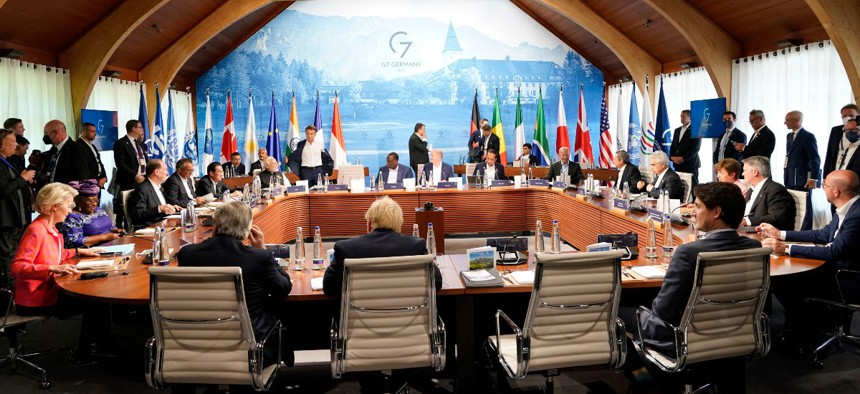Key State Official Warns of ‘Peril’ as US Pursues Cybersecurity Goals at G7

Representatives of Seven rich nations (G7) and Outreach guests are pictured at the start of their fifth working session about "Investing in a better future: Climate, Energy, Health" on June 27, 2022 at Elmau Castle, southern Germany, during the G7 Summit. SUSAN WALSH/POOL/AFP via Getty Image
The State Department would oversee $200 billion in aid and financing the administration wants to invest in developing countries, under a new agreement from world leaders that promises a prioritization of cybersecurity.
The U.S. advanced efforts to outrun China in supplying the market for emerging technologies across the globe with a presidential memo on agencies coordinating with those of the world’s leading economies, including to establish criteria for distributing hundreds of billions of development dollars. Some officials are worried about the implications for cybersecurity.
The White House announced the Partnership for Global Infrastructure and Investment Sunday in advance of the annual meeting of leaders from a group of the world’s richest nations—Canada, France, Germany, Italy, Japan, the United Kingdom and the European Union, along with the United States—happening through Tuesday. The U.S. has committed to a third of the $600 billion partnership, and the plan is contingent on congressional approval.
According to a presidential memorandum issued alongside a fact sheet from the White House, the effort will try to, “align G7 and other like-minded partners to coordinate our respective approaches, investment criteria, expertise and resources on infrastructure to advance a common vision and better meet the needs of low- and middle-income countries and regions.”
Securing information and communications technology networks is one of four areas—along with addressing the climate crisis, promoting gender equity and equality and upgrading global health systems—the G7 partners agreed to prioritize. But that’s highly sensitive ground for adversaries like Russia and China, as well as for the developing countries the G7 partners are trying to build inroads with.
“I think having the G7, the US and Europe sort of writing the rules of the road for the 21st century, comes at our peril,” said Ruth Berry, the acting deputy assistant secretary for international information and communications policy at the State Department. Berry was participating in an event the centrist Third Way think tank held Wednesday on the prospect of an authoritarian China dominating the digital world order.
“I think creating more inclusive and democratic processes that bring in emerging countries who will have incredible innovation over the coming decades and be the users and deployers of so much of this emerging technology is also really important,” Berry said, noting a 60-nation declaration the White House led in April on the future of the internet.
Since 2018, Berry has moved from the State Department to the National Security Council and back again, working on information technology policy. She returned to State in April as the department operationalized its new bureau of cyberspace and digital policy.
The secretary of State, consulting with the heads of other relevant departments, independent agencies and financing organizations, such as the Export-Import bank and a special presidential coordinator, “shall develop a strategy for using Embassy Deal Teams to identify potential priority infrastructure projects for the PGII and refer promising opportunities to relevant agencies for consideration, based on each agency's strengths and authorities,” according to the president’s memo.
NEXT STORY: GAO: HHS Needs Improved Data Breach Reporting






